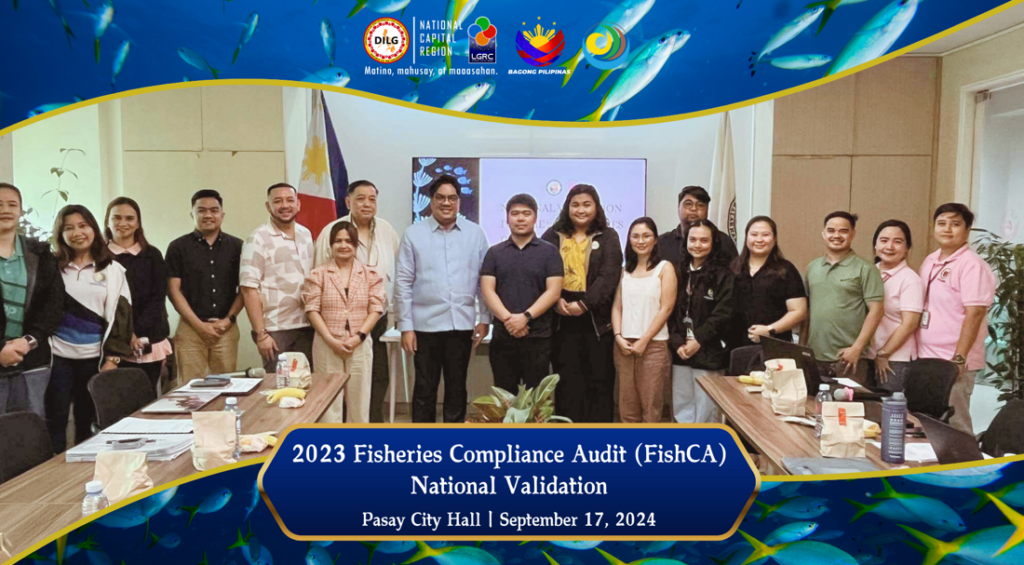
Strengthening Coastal Governance: The 2023 Fisheries Compliance Audit (FishCA) National Validation
The 2023 Fisheries Compliance Audit (FishCA) National Validation marks another important step in coastal governance, especially in the National Capital Region (NCR), where coastal ecosystems like Manila Bay are vital to both environmental and socio-economic well-being. Spearheaded by the Department of the Interior and Local Government – National Capital Region (DILG-NCR) through the Manila Bay Clean-up, Rehabilitation, and Preservation Program (MBCRPP), this annual initiative underscores the regionâs commitment to sustainable coastal resource management. This yearâs FishCA validation, held in Pasay City, focused on ensuring that the local government unit (LGU) is compliant with key environmental laws that safeguard coastal ecosystems.
A Collaborative Approach to Coastal Resource Management
The Fisheries Compliance Audit (FishCA) was designed to assess how coastal LGUs measure up against the provisions of Republic Act No. 8550, otherwise known as the Philippine Fisheries Code of 1998, as amended by Republic Act No. 10654. The law serves as a comprehensive framework for managing and conserving the country’s fisheries and aquatic resources. Compliance is particularly crucial for LGUs within the Manila Bay Watershed Area, which has been under a Supreme Court directive (G.R. Nos. 171947-48) mandating 13 National Government Agencies to clean up, rehabilitate, and preserve the ecologically significant Manila Bay.
The FishCA National Validation Team (NVT) brought together representatives from key national government agencies like the Bureau of Fisheries and Aquatic Resources (BFAR) and the Department of Environment and Natural Resources (DENR), along with the DILG MBCRP-Project Management Office and civil society organizations, OCEANA Philippines. Together, this multi-sectoral team conducted on-the-ground assessments and provided technical assistance to Pasay City, evaluating their compliance with coastal resource management guidelines. The face-to-face validation format not only facilitated a thorough review but also fostered meaningful interactions between the NVT and Pasay City officials, strengthening their efforts to protect and manage the coastal environment.
Pasay City’s Commitment to Sustainability
Pasay City, one of the five (5) coastal LGUs in NCR along Manila Bay, demonstrated notable progress in its coastal resource management initiatives. During the validation process, Pasayâs strategies for empowering local fisherfolk and conserving natural resources were recognized, underscoring the cityâs dedication to sustainable governance. While challenges in coastal management persist, the cityâs commitment to improvement remains strong. The validation served as a valuable learning opportunity, allowing LGUs to refine their practices based on expert feedback and technical guidance from the NVT.
The auditâs results reflected Pasay Cityâs positive strides in compliance but also highlighted the need for ongoing capacity-building initiatives to ensure that local communities, particularly fisherfolk, are adequately equipped to sustainably manage their natural resources. This approach will be crucial in addressing the broader environmental issues that continue to threaten Manila Bayâs ecosystem.
Collective Action for Lasting Impact
The 2023 FishCA Regional and National Validation demonstrated the vital role of collaborative governance in achieving sustainable coastal management. Every LGU involved in the audit, participated actively, reflecting a growing awareness that the preservation of coastal ecosystems requires the concerted efforts of all stakeholdersâlocal government units, national government agencies, civil society organizations, and the communities that depend on these ecosystems for their livelihood.
As the DILG-NCR continues to conduct the FishCA annually, the auditâs results will serve as a blueprint for refining coastal governance strategies. By identifying specific challenges faced by individual LGUs, the audit paves the way for the development of tailored initiatives aimed at strengthening the capacity of local governments to manage their coastal resources effectively.
Strengthening Coastal Governance: The Path Forward
The ongoing success of the FishCA initiative illustrates the potential for meaningful progress through cooperative efforts. As the audit moves forward, one clear message has emerged: the sustainability of Manila Bayâand other coastal areasâhinges on the collective commitment of all involved. The DILG-NCR remains dedicated to supporting LGUs in their journey toward improved coastal management, guided by a shared responsibility to conserve, rehabilitate, and preserve these precious ecosystems.
Looking ahead, the Fisheries Compliance Audit will continue to be a key instrument in assessing and enhancing the environmental governance practices of NCRâs coastal LGUs. The road to a fully sustainable coastal management framework is long, but with initiatives like FishCA, and the unwavering commitment of local governments and their communities, there is hope for a future where Manila Bay can once again thrive as a vital resource for both nature and people.
Conclusion
The Fisheries Compliance Audit (FishCA) is more than just a performance assessmentâit is a crucial step toward the long-term sustainability of Manila Bay and the surrounding coastal ecosystems. Through collaborative efforts and continuous improvement, the coastal LGUs in the NCR are laying the foundation for a balanced, healthful, and vibrant ecosystem that future generations can continue to benefit from. With strong leadership from both national and local levels, and with the active involvement of civil society, the dream of a rehabilitated and preserved Manila Bay is slowly but surely becoming a reality.
